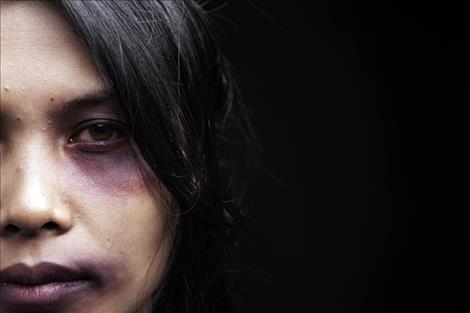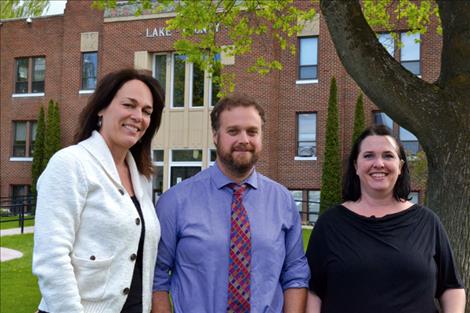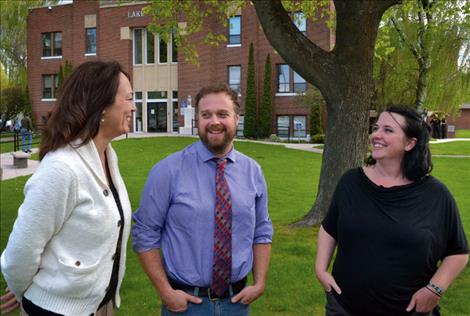DOJ grant expands victim services in Lake County
Hey savvy news reader! Thanks for choosing local.
You are now reading
1 of 3 free articles.
Victims of domestic violence can get lost in the court system and their abusers may not get the help they need — or the punishment. The problem increases as felony criminal cases rise in Lake County, doubling between 2014 and 2015, and could double again this year.
As an understaffed county attempts to battle the onslaught, one solution has emerged in the form of a $437,000, three-year federal grant received through the Office on Violence Against Women, a division of the U.S. Department of Justice.
SAFE Harbor spearheaded the grant to get more victim-centered services in Lake County. The Improving Criminal Justice Responses to Sexual Assault, Domestic Violence, Dating Violence, and Stalking Grant Program provides funding for training and has allowed the county attorney’s office to hire attorney Brendan McQuillan as the Crime Victim Special Prosecutor whose sole job is to prosecute those who commit domestic violence and sex crimes. McQuillan has been on the job since January, and is currently working about 100 active cases, including 33 open felony cases.
The grant also provides for county paralegal Amber Lester to serve as the Victim Witness Specialist-Coordinator, whose goal is to maintain contact with the victims and keep them engaged in the process throughout the prosecution of the case.
“And just make sure they are notified every step of the way,” Lester said.
That was a real problem for Lake County, with too few attorneys and no one specifically working on these cases, according to McQuillan.
Domestic violence cases often rely on the victim testifying against the offender, who is usually someone in a very close relationship to the victim. If the victim doesn’t testify, the offender may not receive adequate punishment. Because victims of domestic abuse are emotionally and physically controlled by the perpetrator, it’s difficult for the victim to overcome the fear of standing up to the abuser. Victims need to understand they have a team of people to support them so they don’t feel so intimidated by the system, McQuillan said.
“A lot of folks aren’t that eager to go in and testify against their spouse,” he said. “We have to have our victims willing and capable of testifying.”
When he worked as a defense attorney, McQuillan saw what often happened in the courtroom.
“If you pushed them toward trial, usually the prosecution, frankly, would fold. It was really important that it be one person’s sole job to do these cases, so they are really invested in them, and … not let them fall by the wayside.”
Dee Ann Richardson, executive director of SAFE Harbor, works closely with McQuillan and Lester, empowering the victim while advocating in civil matters such as helping the victim file for dissolution of marriage, court orders of protection, and parenting plans.
When a domestic violence call comes in, police officers are the first on the scene, removing the parties from each other.
“Quite often law enforcement calls us at all hours,” Richardson said. “That’s why we have a 24-hour hotline.”
SAFE Harbor can get the victim into a safe hotel for the night and provide clothing vouchers so the victim won’t have to return home. They also offer a 30-day emergency shelter.
What the victim accepts varies on their situation, Richardson said. Some want to leave and go to where their support system is, and SAFE Harbor will purchase a bus ticket home.
“Clients have eternal optimism that things are going change,” Richardson said. “We tell them no one is going to judge you. You can call us at any time.”
They offer group counseling services for women, where children attend play therapy onsite while mothers meet with a licensed counselor.
There’s also counseling for the perpetrator.
“If a person is convicted of partner family member assault or aggravated assault against a domestic partner, they are required by state law to do 40 hours of aggression/control-style therapy,” McQuillan said. “SAFE Harbor is the only place that offers this in this jurisdiction.”
The ultimate goal of all parties is to stop the cycle of violence.
“I think society cares about stopping date rape, ending rape culture, stopping the cycle of violence in general,” McQuillan said, “because children who are exposed to violence and sex assaults are more likely to commit them down the road, or to be victims themselves.”
That means figuring out what causes the aggression, whether it’s untreated mental health issues or addiction issues, and try to fix it.
Yet, “If a victim is victimized, we absolutely need to punish the perpetrator,” McQuillan said.
The team will be working cases backlogged as far back as 2012.
“Domestic violence and sexual assault reaches across every demographic,” Richardson said. “How would you like to be one of those individuals whose case has been sitting on the shelf for three years? This ensures that doesn’t happen.”
While the grant program is too new to quantify results, the team will be reporting every six months, and they hope the grant will be renewed after three years.
“Our goal is justice, and to make the community whole,” McQuillan said. “We are here to create restorative justice.”


















